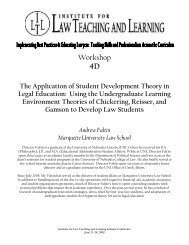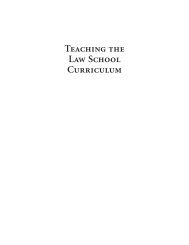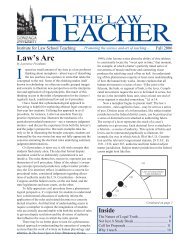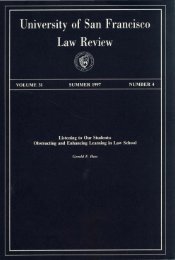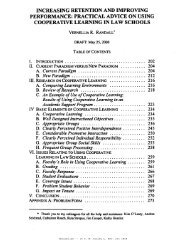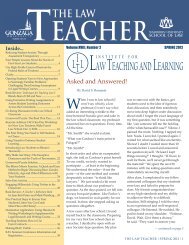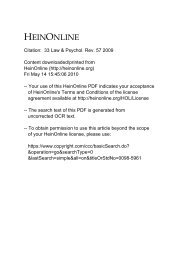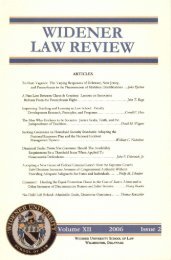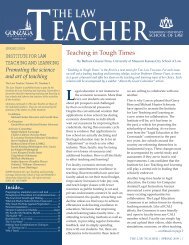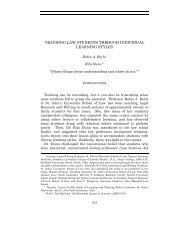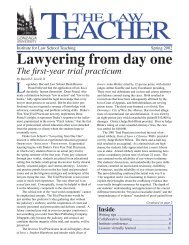The Law Teacher - Institute for Law Teaching and Learning
The Law Teacher - Institute for Law Teaching and Learning
The Law Teacher - Institute for Law Teaching and Learning
You also want an ePaper? Increase the reach of your titles
YUMPU automatically turns print PDFs into web optimized ePapers that Google loves.
<strong>The</strong> Un<strong>for</strong>tunate Story exercise: recognizing a Diversity of Student experience<br />
— continued from page 2<br />
<strong>and</strong> what, if anything, you would do<br />
differently were this event to occur<br />
today. This assignment is limited to<br />
250 words. Please be prepared to read<br />
your story aloud on the first day of<br />
class.<br />
<strong>The</strong> assignment is wide open, not limited<br />
to law or law school in any way, <strong>and</strong><br />
the student may tell any story that he or<br />
she finds com<strong>for</strong>table to read aloud to a<br />
room full of strangers.<br />
Over the few years since I developed the<br />
Un<strong>for</strong>tunate Story assignment, I have<br />
discovered that the assignment is useful<br />
to discover the diverse backgrounds of<br />
the students as well as <strong>for</strong> assessment<br />
purposes. <strong>The</strong> Un<strong>for</strong>tunate Story is a<br />
great icebreaker on the first day of class,<br />
as everyone must st<strong>and</strong> up in front of<br />
the class <strong>and</strong> tell his or her story. we<br />
all learn something about a classmate<br />
that may not arise out of the traditional<br />
introduction that generally includes<br />
the student’s hometown, where he or<br />
she went to college, or where she or he<br />
worked. Through the Un<strong>for</strong>tunate Story,<br />
I learn unique in<strong>for</strong>mation about each<br />
student that is interesting, provides<br />
details about each student’s diversity of<br />
experience, <strong>and</strong> makes it easier <strong>for</strong> me<br />
to remember his or her name. I enjoy<br />
getting to know students through their<br />
personal stories. <strong>The</strong> students also learn<br />
to appreciate their classmates’ diversity<br />
of experiences through the Un<strong>for</strong>tunate<br />
Story.<br />
as an initial assessment tool, the<br />
Un<strong>for</strong>tunate Story allows me to<br />
evaluate: (1) whether the student can<br />
follow directions, i.e., did he or she<br />
follow the word count limit <strong>and</strong> the<br />
details of the assignment? Did he or<br />
she read the written story to the class or<br />
just recount an event out of his or her<br />
head; (2) the student’s writing skills,<br />
i.e., basic grammar, punctuation <strong>and</strong><br />
sentence <strong>for</strong>mation; (3) the student’s oral<br />
communication skills, i.e., whether the<br />
student is com<strong>for</strong>table speaking aloud,<br />
any <strong>for</strong>eign language diversity issues<br />
that may require eSL coaching or other<br />
educational attention; <strong>and</strong> (4) whether<br />
the student may require attention <strong>for</strong><br />
personal or psychological issues, i.e., to<br />
identify possible academic per<strong>for</strong>mance<br />
accommodations <strong>and</strong> make referrals to<br />
the appropriate professionals.<br />
Through the Un<strong>for</strong>tunate Story, I can<br />
also gauge students’ diversity of life<br />
experience <strong>and</strong> possible learning styles.<br />
Stories range from straight<strong>for</strong>ward to<br />
humorous to very sad <strong>and</strong> upsetting.<br />
For example, new college graduates’<br />
Un<strong>for</strong>tunate Stories tend to revolve<br />
around events that occurred in cars<br />
(about one-third of student stories are car<br />
stories), getting stuck on the highway,<br />
getting lost, getting a car towed, getting<br />
tickets. Younger students are accustomed<br />
to a college classroom environment.<br />
More seasoned students may relay<br />
stories about work, children or other<br />
significant life issues, <strong>and</strong> may have an<br />
adjustment period in returning to the<br />
classroom setting after years away from<br />
school. Sometimes, Un<strong>for</strong>tunate Stories<br />
provide great insight as to potential<br />
personal difficulties that students may<br />
bring to school regarding family or other<br />
relationships. we all know that law<br />
school is a delicate balancing act <strong>and</strong> that<br />
maintaining a professional-personal life<br />
balance is difficult during the rigors of a<br />
law school education.<br />
Some of the Un<strong>for</strong>tunate Stories students<br />
share are highly unusual <strong>and</strong> dramatic,<br />
<strong>and</strong> include the following:<br />
• Being kidnapped by Bedouins on a<br />
camel in Turkey<br />
• Becoming blind in one eye in a sports<br />
accident<br />
• Losing a job on a television reality<br />
show after a producer committed<br />
murder <strong>and</strong> suicide<br />
• Being separated from a parent <strong>and</strong><br />
later reuniting with that parent<br />
• Discovering that an absent parent has<br />
stolen the student’s identity<br />
• Being mugged <strong>and</strong> fighting <strong>for</strong> life<br />
on the street on a bitterly cold Moscow<br />
night.<br />
Often, the diverse Un<strong>for</strong>tunate Stories<br />
will spur a legal discussion or define an<br />
interest in the classroom. This semester<br />
I heard a series of pet stories that<br />
prompted the class to discuss animal<br />
law <strong>and</strong> animal rights. <strong>The</strong> Un<strong>for</strong>tunate<br />
Story also often prompts a discussion<br />
of potential personal injury lawsuits<br />
<strong>and</strong> the requirements to prove an injury<br />
(a good lead-in <strong>for</strong> a torts problem<br />
assignment). <strong>The</strong> Un<strong>for</strong>tunate Story<br />
can open up diverse discussion topics<br />
in class on the day that the stories<br />
are relayed, <strong>for</strong> an entire semester, or<br />
sometimes even <strong>for</strong> an entire year.<br />
at the beginning of the semester, I<br />
promise the students that I will read<br />
to them my own Un<strong>for</strong>tunate Story.<br />
I tell the students that I underst<strong>and</strong><br />
how difficult it is to be restricted to a<br />
word limit, but that many courts (<strong>and</strong><br />
publications!) have a word limit <strong>for</strong><br />
filings/articles so it is good practice in<br />
legal writing to be subject to a word<br />
limit requirement. when I read my story<br />
to the class at the end of the semester, I<br />
follow my own instructions. I write my<br />
own Un<strong>for</strong>tunate Stories constantly to<br />
challenge myself, <strong>and</strong> I read different<br />
stories to my classes each semester.<br />
<strong>The</strong> Un<strong>for</strong>tunate Story assignment is<br />
a useful introductory in<strong>for</strong>mation <strong>and</strong><br />
assessment tool <strong>for</strong> both an introductory<br />
legal writing <strong>and</strong> an advanced elective<br />
class. If you are looking <strong>for</strong> a new<br />
method to break the ice in class or to gain<br />
initial assessment in<strong>for</strong>mation regarding<br />
your students’ diversity of experiences<br />
<strong>and</strong> communication skills, try assigning<br />
the Un<strong>for</strong>tunate Story. <strong>and</strong> please drop<br />
me a line <strong>and</strong> let me know how it goes<br />
<strong>for</strong> your class.<br />
____________<br />
Deborah L. Borman is a clinical assistant<br />
professor of law at Northwestern University<br />
School of <strong>Law</strong>. Contact her at deborah.<br />
borman@law.northwestern.edu.<br />
<strong>The</strong> <strong>Law</strong> <strong>Teacher</strong> | FaLL 2012 | 3



